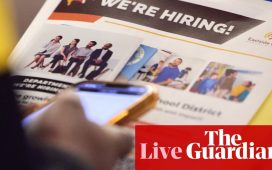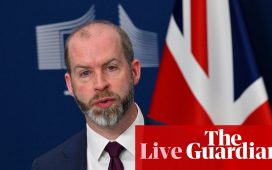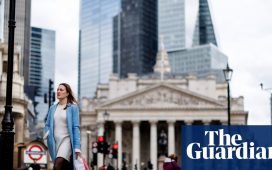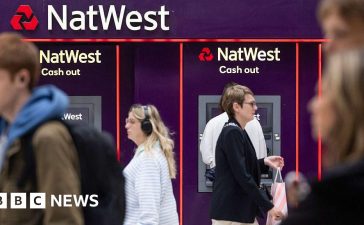Introduction: UK consumer confidence ahead of ‘painful’ Budget
Good morning, and welcome to our rolling coverage of business, the financial markets and the world economy.
Fears of a ‘painful budget’ next month have knocked morale among UK consumers – a bad sign for the economy.
The latest poll of UK consumer confidence has fallen sharply this month, with optimism over people’s personal finances, their purchase intentions, and the state of the economy all sharply lower than in August.
The index, published by data provider GfK, has dropped to -20 this month, down from -13 in August.
That is the lowest reading since March, when the index was -21,
Consumer confidence had been improving as the economy grew robustly in the first half of this year and inflation dropped.
But September’s large drop has almost wiped out the recovery in confidence seen since this spring.

The drop follows repeated warnings that next month’s budget will include tax rises to fix the public finances, following the unpopular decision to means-test the winter fuel payments for pensioners.
Neil Bellamy, consumer insights director at GfK, says the forward-looking indicators which feed into the index have dropped notably:
Bellamy explains:
All five measures are down but there are major corrections in the outlook for our personal financial situation for the next 12 months (down nine points), our views on the general economy for the coming year (down 12 points), and the major purchase index (down ten points).
These three measures are key forward-looking indicators so, despite stable inflation and the prospect of further cuts in the base interest rate, this is not encouraging news for the UK’s new government.
Strong consumer confidence matters because it underpins economic growth and is a significant driver of shoppers’ willingness to spend, Bellamy adds.
Earlier this week, DIY company Kingfisher reported weak demand for kitchens and bathrooms, as people resisted buying ‘big ticket’ items.
Bellamy adds that consumers are “nervously” awaiting Rachel Reeves’s budget statement on 30 October, saying:
Following the withdrawal of the winter fuel payments, and clear warnings of further difficult decisions to come on tax, spending and welfare, consumers are nervously awaiting the Budget decisions on 30th October.”
GfK polled just over 2,000 people, between 30 August and 13 September.
A few days before the survey began, Keir Starmer warned in a setpiece speech that the budget is “going to be painful”, and that “things are worse than we ever imagined”, after the government discovered what it calls a £22bn “black hole” in the public finances.
On the final day of its survey, Starmer hammered the point home, warned that painful decisions such as cutting winter fuel payment were necessary to fix the UK.
That message appears to have got through to consumers, even though Labour have also pledged not to raise the taxes on working people.

The agenda
-
7am BST: UK retail sales for August
-
7am BST: UK public finances for August
-
9am BST: Bank of England policymaker Catherine Mann speaks about the issue of macroeconomic adjustments after large global shocks
-
3.50pm BST: European Central Bank chief Christine Lagarde to deliver 2024 Michel Camdessus Annual Central Banking Lecture
Key events
Tom Hunt appointed editor-in-chief of the Express

Mark Sweney
Newspaper publisher Reach has appointed Tom Hunt, online editorial director at The Express, as the new editor-in-chief of the title, following the departure of Gary Jones.
Jones, who has edited the title since 2018 following Reach’s £200m deal to buy the Express and Star from Richard Desmond, has worked at the Mirror publisher since 1996.
He has held roles including editor of The Sunday Mirror and The People.
“It’s been a privilege to have served the readers for so many years,” said Jones. “Long may they continue to value and cherish the journalism we publish.”
The departure of Jones, the lifelong Labour-supporting, remain-voting ex-Sunday Mirror editor, follows that of senior editorial executives including the Daily Mirror editor Alison Phillips and the group editor-in-chief Lloyd Embley.
Hunt, who has worked at The Express for eight years, has previously held roles including video news editor and head of news of the Express website.
David Higgerson, chief digital publisher at Reach, says:
“With his strong understanding of the digital landscape and passion for the brand, we know he’s the right person to take the Express into the next phase of its evolution.”
Bank of England’s Mann: must avoid ‘boogie-dance’ on rates
Bank of England policymaker Catherine Mann has said she is keen to avoid conducting a “boogie-dance” with policy rates, as she explains why she voted to leave UK interest rates on hold yesterday.
Mann is one of the hawkish members of the Bank’s monetary policy committee, worried about the persistence of inflation.
In August, she opposed the Bank’s rate cut – and was one of four policymakers who wanted to leave rates at 5.25%.
This week, though, she was in the majority voting to keep rates at 5%.
Speaking in Lithuania this morning, Mann explains why she didn’t push for rates to move back to 5.25% this month:
Why was it not good policy for me to vote to hike at this September meeting, to get back to the August stance, if I thought that was the appropriate level for Bank Rate?
In fact, in August, I did contemplate a cut at that meeting, as the bite from housing costs was becoming deeper and more widespread but was dissuaded by the balance of factors already mentioned, as well as a generalized easing in global conditions that affected UK rates too.
If I had voted to hike in the meeting just past only to cut sometime soon hence, this would be the ‘boogie-dance’ with policy rates that I eschewed in my Lamfalussy speech in February 2023.
Mann also warns that middle-income households are being squeezed by rising housing costs (mortgages and rents), saying:
There is a further accumulation of evidence of consumer weakness across products and particularly middleincome deciles, as housing costs are a larger fraction of their consumption basket.
That argument is rather backed up by the drop in consumer confidence this month….
And on inflation, Mann says she agrees with financial market participants who believe that inflation could stay above target for an extended period of time.

Mark Sweney
Thames Water has started discussions with lenders for permission to access more than £1bn of cash reserves to enable it to stay afloat until May next year.
The troubled water company, which is struggling under £15bn of debts, has admitted that it only has enough cash left to run its operations for eight months.
The talks with lenders, revealed by The Guardian on Thursday, were confirmed in a statement from Thames on Friday morning.
“As contingency planning, we have entered into discussions with our financial stakeholders to release cash reserves under our financing,” the company said on Friday. “This would require majority creditor consent.”
The company said:
“We previously announced… that we would be engaging with potential investors and creditors to seek new equity and to extend our liquidity runway.
On Friday, Thames Water said access to these funds would give it enough funds to continue to operate until May next year.
The company said that as at 31 August it had £1.6bn of liquidity. However, £800m of that requires lender approval to access. A further £550m of undrawn liquidity facilities also requires lender approval.
“The combination of these resources provides a liquidity runway to May 2025,” the company said, adding:
“We, together with our financial stakeholders, are considering options for the extension of our liquidity runway to enable time to complete a recapitalisation transaction. In parallel, we continue to undertake contingency planning as a matter of good corporate practice.”
Thames Water said that if it does not gain consent its current available funding will run out at the end of December, “whereupon we would enter standstill under our financing and the £550m of undrawn reserve liquidity facilities and £380m of cash reserves would become available”.
The struggling water company, which has 16 million customers across London, has booked dates at the high court in November to potentially gain court approval to change repayment terms, as part of its wider effort to stave off falling into a form of temporary renationalisation.
Its fate is one of the biggest challenges facing the government as Thames battles to raise billions of pounds in fresh funding to avoid falling into government control under a special administration regime.
Shares have dropped in London this morning.
Both the blue-chip FTSE 100 and the smaller FTSE 250 index of medium-sized firms are down around 0.5%.
Richard Hunter, head of markets at interactive investor, says the “poor” UK consumer confidence reading this morning “was felt most keenly in the FTSE 250” (it is more of a barometer of the UK economy).
Hunter adds that there is also disappointment that China’s central bank left its interest rates on hold today, “when investors had been crying out for a reduction to provide a boost to the flagging economy”.
Pound hits highest since March 2022
The pound has shrugged off this morning’s slump in consumer confidence, and hit a two and a half-year high against the US dollar.
Sterling rallied to $1.334 this morning, its highest level against the dollar since March 2022.
It strengthened after this morning’s retail sales showed consumer spending in the shops was stronger than expected in August.
The pound also benefitted from the Bank of England’s decision not to cut UK interest rates yesterday – unlike the US Federal Reserve, which slashed its key rate by half a percentage point on Wednesday.
The City do expect the Bank to cut rates in November, though; yesterday, governor Andrew Bailey said he was “optimistic” that borrowing costs would come down.
This morning, a November rate cut is seen as a 75% chance by the money markets.
Darren Jones, the Chief Secretary to the Treasury, says the government is taking “tough decisions” to fix the public finances.
Responding to August’s borrowing figures, Jones says:
“When we came into office, we inherited an economy that wasn’t working for working people. Today’s data shows the highest August borrowing on record, outside the pandemic.
Debt is 100% of GDP, the highest level since the 1960s. Because of the £22 billion black hole in our public finances we have inherited this year alone, we are now taking the tough decisions now to fix the foundations of our economy, so we can rebuild Britain and make every part of the country better off.”
UK national debt hits 100% of GDP
The £13.7bn jump in government borrowing last month means that the UK’s national debt has now hit 100% of GDP – an unwelcome milestone.
The ONS reports that public sector net debt (excluding public sector banks) was provisionally estimated at £2.768 trillion at the end of August 2024, or 100.0% of gross domestic product (GDP).
That’s an increase of 4.3 percentage points over the last year, and takes the national debt to its highest level since the early 1960s.
Public sector net debt excluding public sector banks was £2,768.0 billion at the end of August 2024, provisionally estimated to be around 100.0% of the UK’s annual gross domestic product. pic.twitter.com/hUp407Lhsv
— Office for National Statistics (ONS) (@ONS) September 20, 2024
The national debt is lower, though, if you exclude the impact of the Bank of England’s quantitative easing stimulus programme.
Strip out the Bank of England, and net debt is £2.546 trillion, or around 92.0% of GDP.
Rachel Reeves could potentially changing the way debt is measured, to exclude the Bank of England. That would give the chancellor more fiscal wriggle room in October’s budget.
Back in 2010, an influential research paper by economists Kenneth Rogoff and Carmen Reinhart found that public debt of more than 90% of GDP slows down a country’s growth.
However, the report – used to justify the UK’s austerity programme – was later discredited after a mistake in the spreadsheet underpinning the work was discovered.
UK borrowing jumps to £13.7bn in August
Newsflash: The UK government has borrowed over £6bn more than forecast so far this financial year, after a jump in borrowing last month.
The Office for National Statistics has reported that the UK borrowed £13.7bn in August, which is £3.3bn more than in August 2023.
It’s the third highest borrowing for any August since 1993, and more than £1bn higher than the £12.4bn City economists had expected.
And it takes borrowing so far this financial year (since April) to £64.1bn.
Significantly, it is £6.2bn more than the £57.8bn forecast by the Office for Budget Responsibility for this period.
That difference is why Rachel Reeves and Keir Starmer are talking about tough choices and a painful budget this autumn.
The latest public finances report shows that government tax receipts rose by £3.7bn last month, with income tax, VAT and corporation tax all bringing in more money. Former chancellor Jeremy Hunt’s decision to cut national insurance rates reduced the tax take from compulsory social contributions by £600m though.
And the increase in taxes was more than wiped out by rising government spending. It rose by £6.1bn year-on-year, including a £2.7bn increase in benefits payments due to inflation-linked benefits uprating, and a £2.5bn increase in departmental spending.
Consumer confidence plunge is largest since April 2022
This month’s plunge in consumer confidence is the steepest since April 2022, when energy costs were spiraling in the wake of Russia’s invasion of Ukraine, points out Bloomberg.
They say:
UK consumer confidence crashed in September by the most in two-and-a-half years amid dire warnings from the new Labour government about “tough decisions” that need to be taken to fix the public finances.
UK consumer confidence crashed in September by the most in two-and-a-half years during dire warnings from the new Labour government about “tough decisions” that need to be taken to fix the public finances https://t.co/JqKRNPaHKz
— Bloomberg Markets (@markets) September 20, 2024
Retail sales rise in August
Newsflash: retail sales across Great Britain jumped last month, despite the slump in consumer confidence.
The Office for National Statistics has reported that the volume of goods bought in August rose by 1%, following a 0.7% rise in July.
Some supermarkets and clothing retailers reported a boost because of warmer weather and end-of-season sales, the ONS says.
Sales rose fastest at textile, clothing and footware stores, followed by food outlets, in August.
ONS chief economist Grant Fitzner says:
“Retail sales rose in August as warmer weather and end of season promotions helped to boost sales, most notably for clothing and food shops. Supermarkets, in particular, contributed to the largest annual rise for food sales since the summer of 2021.
“Looking at the broader picture, retail sales have also increased across the three month and annual period, following strong growth from online retailers. However, sales overall remain slightly below their pre-pandemic level.”
Justin King: budget gloom to blame for falling confidence
Veteran retailer Justin King agrees that budget fears are responsible for the plunge in consumer confidence this month.
King, the former CEO of Sainsbury’s, told Radio 4’s Today programme:
“I think it probably is, actually.
The trend line [in consumer confidence’ has been positive for a while.
That’s because the reality for most people has been positive for a while.
King points out that wage settlements have been running ahead of inflation this year (meaning real wages are rising), and that household budgets have largely absorbed the shock of the cost of living crisis.
It felt like things were getting a little better, but obviously we’ve had this backdrop of bad news.
King adds, though, that there needs to be a “reset” after the general election.
I think they’d argue it’s a step backwards before the step forward they intend to take.
Conservative MP Robert Jenrick, a candidate to become the party’s next leader, has blamed the government for the drop in consumer confidence this month.
Jenrick told the Financial Times:
“The new Labour government has created a great deal of uncertainty among investors and that’s harming our economy.”
Introduction: UK consumer confidence ahead of ‘painful’ Budget
Good morning, and welcome to our rolling coverage of business, the financial markets and the world economy.
Fears of a ‘painful budget’ next month have knocked morale among UK consumers – a bad sign for the economy.
The latest poll of UK consumer confidence has fallen sharply this month, with optimism over people’s personal finances, their purchase intentions, and the state of the economy all sharply lower than in August.
The index, published by data provider GfK, has dropped to -20 this month, down from -13 in August.
That is the lowest reading since March, when the index was -21,
Consumer confidence had been improving as the economy grew robustly in the first half of this year and inflation dropped.
But September’s large drop has almost wiped out the recovery in confidence seen since this spring.
The drop follows repeated warnings that next month’s budget will include tax rises to fix the public finances, following the unpopular decision to means-test the winter fuel payments for pensioners.
Neil Bellamy, consumer insights director at GfK, says the forward-looking indicators which feed into the index have dropped notably:
Bellamy explains:
All five measures are down but there are major corrections in the outlook for our personal financial situation for the next 12 months (down nine points), our views on the general economy for the coming year (down 12 points), and the major purchase index (down ten points).
These three measures are key forward-looking indicators so, despite stable inflation and the prospect of further cuts in the base interest rate, this is not encouraging news for the UK’s new government.
Strong consumer confidence matters because it underpins economic growth and is a significant driver of shoppers’ willingness to spend, Bellamy adds.
Earlier this week, DIY company Kingfisher reported weak demand for kitchens and bathrooms, as people resisted buying ‘big ticket’ items.
Bellamy adds that consumers are “nervously” awaiting Rachel Reeves’s budget statement on 30 October, saying:
Following the withdrawal of the winter fuel payments, and clear warnings of further difficult decisions to come on tax, spending and welfare, consumers are nervously awaiting the Budget decisions on 30th October.”
GfK polled just over 2,000 people, between 30 August and 13 September.
A few days before the survey began, Keir Starmer warned in a setpiece speech that the budget is “going to be painful”, and that “things are worse than we ever imagined”, after the government discovered what it calls a £22bn “black hole” in the public finances.
On the final day of its survey, Starmer hammered the point home, warned that painful decisions such as cutting winter fuel payment were necessary to fix the UK.
That message appears to have got through to consumers, even though Labour have also pledged not to raise the taxes on working people.
The agenda
-
7am BST: UK retail sales for August
-
7am BST: UK public finances for August
-
9am BST: Bank of England policymaker Catherine Mann speaks about the issue of macroeconomic adjustments after large global shocks
-
3.50pm BST: European Central Bank chief Christine Lagarde to deliver 2024 Michel Camdessus Annual Central Banking Lecture






